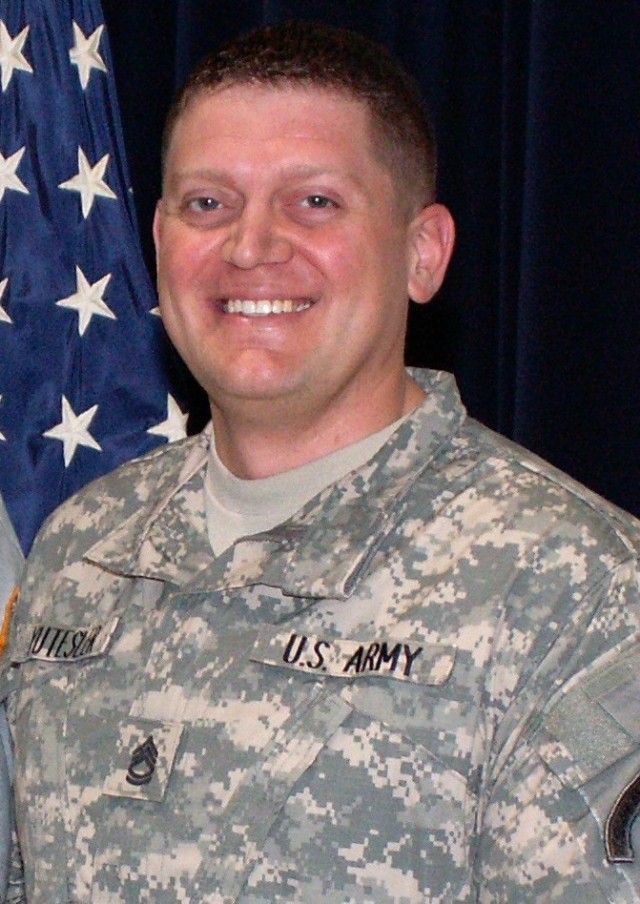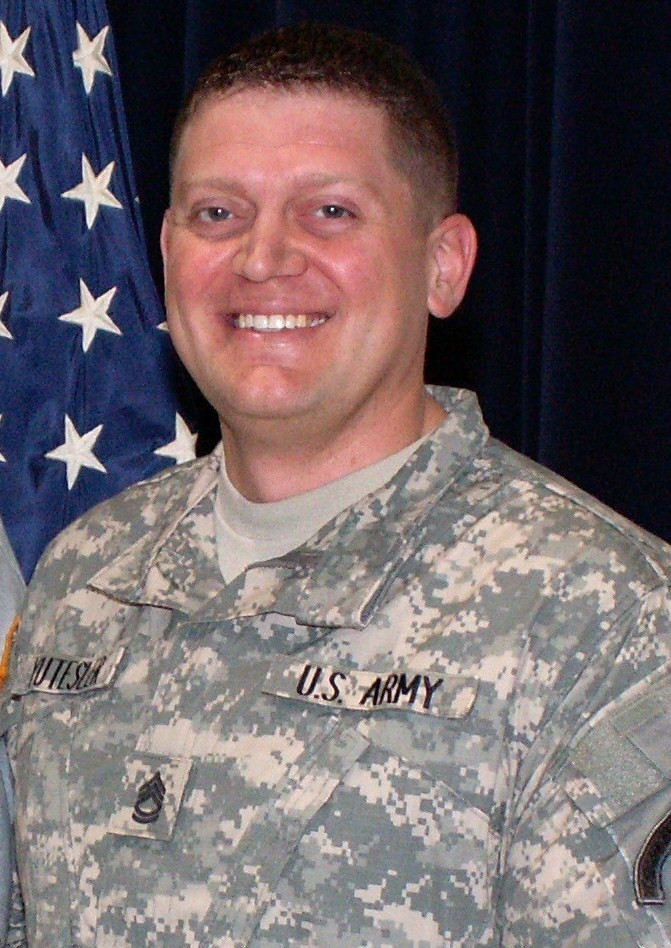FORT MEADE, Md. Aca,!" The touching stories of how others give of themselves, even to total strangers, are inspiring, particularly when the gift is life.
This is one such story.
Sgt. 1st Class Bernie Yutesler, a senior noncommissioned officer with The United States Army Field Band, is an unassuming Soldier.
He doesnAca,!a,,ct brag. He is not self-promoting. In fact, there are times when you have to pry information from him.
This is one such time.
As Yutesler undergoes injections as part of the bone marrow donation process, his demeanor has not changed. He is his usual self--happy and willing to help others no matter what the problem. Perhaps there is one exception: he is a bit grumpy since he cannot partake of his typical cup or two of morning coffee (it is suggested for those donating bone marrow that they not consume caffeine or alcohol until a week following the actual donation).
For approximately one week, Yutesler will receive shots to increase bone marrow production. The stem cells are painfully forced from his bones into his blood stream so that they can be collected and provided to the recipient.
Several months ago, he received a call from Thomas Chen, a preliminary match coordinator for the confirmatory typing department at the C.W. Bill Young Department of Defense (DoD) Bone Marrow Donor program. Chen informed Yutesler that he was a potential match for a terminally-ill patient requiring bone marrow.
Without pause, Yutesler agreed to donate. Since then, Yutesler has undergone a lengthy succession of additional administrative and medical procedures, including the current injections, which often cause side effects such as headaches, bone and muscle aches. Yutesler describes the side effects as being similar to those associated with having the flu.
He doesnAca,!a,,ct mind. He thinks the time and effort involved for his part is well worth it. He is, after all, saving someoneAca,!a,,cs life.
Yet, he does not think of himself as a hero.
Aca,!A"I take great pride in being able to help someone, give someone hope,Aca,!A? he said.
Yutesler is one of 6 million Americans who have joined the National Marrow Donor program, 400,000 of whom are military servicemembers.
Yutesler recalls how he learned of the bone marrow donation program. He was in college at the time.
Aca,!A"I first heard about the registry when I was giving blood as part of the American Red Cross blood drive. I filled out some paperwork, and, along with the blood I had donated, was told my information would be processed into the National Bone Marrow Donor Registry. Upon enlisting in the Army, my information was simply handed off to the Defense Department registry.Aca,!A?
He tells the story like it was yesterday. He remembers specific details, particularly because just a few short days after signing up in the national registry he was notified that he was a potential match.
Aca,!A"When I got the call, I was a bit surprised, for I had just submitted the paperwork and given blood. I got the call two days before I was set to leave for training. I told them that, but they were able to send someone out relatively quickly to perform confirmatory tests (designed to see if the donor is the best possible match for the patient). So I was undergoing additional blood work for the donation program the day I left for basic training.Aca,!A?
Predicting the probability of matching donors to patients, of course, is inconceivable. Some donors may never be considered a match.
But, in YuteslerAca,!a,,cs case, this makes potential match, best match and donation number two!
Naomi Clark, a donor services coordinator in the work-up department for the DoD program, said that the process prior to actual donation takes place in two stages, confirmatory and work-up.
Aca,!A"When a donor is found to be a potential or preliminary match for a patient in need, we contact them to see if they would be interested in being a donor if they are found to be the best match. But, to confirm the match, it usually requires the donor to give a blood sample to determine, or confirm, that they are, indeed, the best match,Aca,!A? she explained.
Aca,!A"Those who arenAca,!a,,ct a match,Aca,!A? she added, Aca,!A"are returned to the active list to be available for other patients.Aca,!A?
According to the national registry, anyone on the list has a 1 in 200 chance of being contacted as a potential match for a transplant patient.
Clark finds it hard to believe that, given the statistics, this will be YuteslerAca,!a,,cs second donation, and commends him for his desire to help others.
Aca,!A"Bernie has been a dream to work with, so kind, generous and completely dedicated to helping others,Aca,!A? noted Clark.
Currently, Yutesler and Clark are in the second stage, the work-up stage.
Once the injections are complete, Yutesler will undergo a peripheral blood stem cell (PBSC) donation, which, according to the national registry, is a non-surgical procedure performed in an apheresis center, a site dedicated to blood re-transfusion. Here, his blood will be taken from one arm, pass through a mechanism that extracts the blood-forming cells, and the remaining blood will then be returned through the other arm.
YuteslerAca,!a,,cs first donation was through the surgical procedure, sometimes referred to as bone marrow harvesting, in which marrow was withdrawn from the back of his pelvic bone using needles.
He admits to being a bit apprehensiveAca,!A|both times. But, the knowledge he has been given has put him at ease.
Aca,!A"I would be concerned with donating if there were long term problems associated with doing so, but I had zero complications from my first donation. Everyone who works in the program ensures all donors are fully versedAca,!A|they send you informational brochures, as well as a video about the process. It really puts you at ease.Aca,!A?
In a couple of days, Yutesler will be sitting in a room watching as his bone marrow is extracted. Following the procedure, he will have physical restrictions while the marrow regenerates itself.
No coffee yet. That wonAca,!a,,ct happen for another week after the donation is complete.
But, within a month or so, he will be back to 100 percent, back to the usual Bernie, still giving of his time, of himself, for others.
Sgt. 1st Class Yutesler exemplifies a true commitment to service to our Nation. His dedication is one such story that illustrates why the Secretary of the Army dedicated 2009 as "The Year of the NCO."
To learn more about The United States Army Field Band, visit our website at www.armyfieldband.com.


Social Sharing